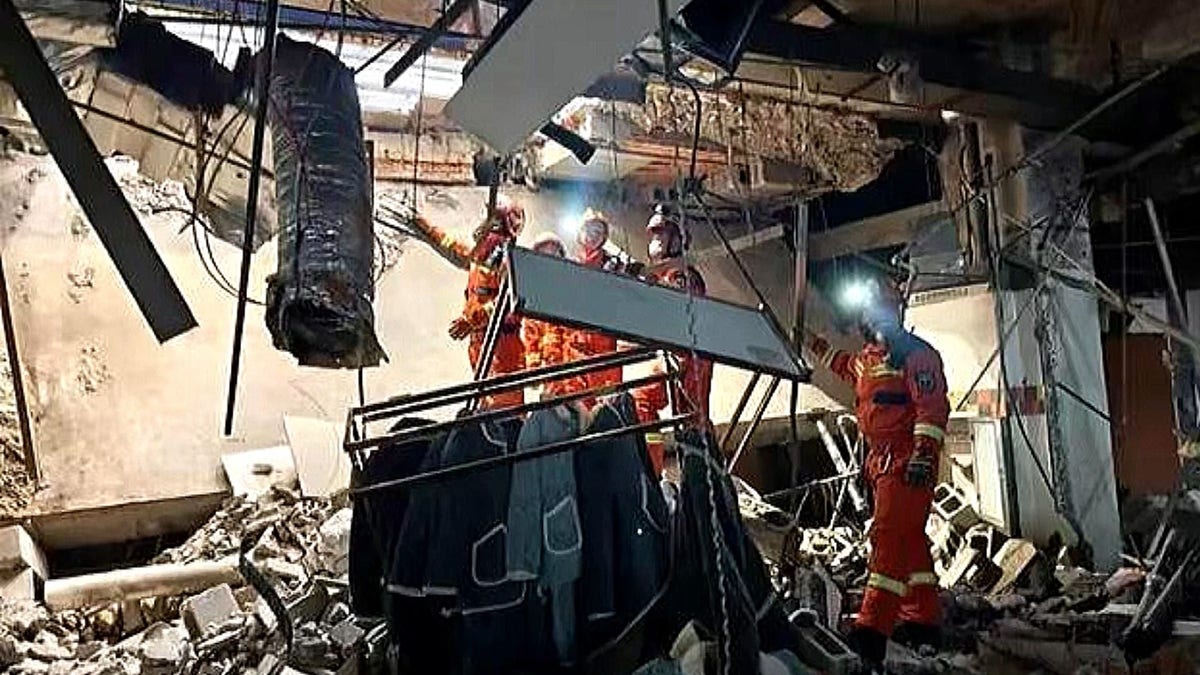Woman falls into sinkhole as shop floor collapses in China
A female customer escaped with some minor fractures after falling into a massive sinkhole when the second floor of a shopping center in China suddenly collapsed. (Courtesy: Newsflare via Reuters Connect.)
Video captured the moment last weekend when a woman casually shopping in a Chinese department store disappeared as a possible sinkhole swallowed a portion of the floor.
A construction worker on the first floor of a shopping mall in the city of Zhenjiang in Jiangsu, China, told local outlets a sinkhole opened up, trapping him and causing the floor above to collapse.
In the video, a woman was walking around on the second story of a shopping mall in Zhenjiang when the floor caved in, toppling two clothing racks as the woman fell through the hole. A second woman, wearing a yellow jacket, ran away from the hole before stopping to go back and check on the other woman, according to Newsflare.
Mr. Huang, a representative of the mall, told reporters both people suffered only minor injuries. Emergency crews and firefighters responded immediately and helped rescue both of the victims before cleaning up the damage.
COULD PROTECTIVE BARRIERS HAVE PREVENTED BALTIMORE BRIDGE COLLAPSE?

A screenshot from security footage at a shopping mall in the city of Zhenjiang in Jiangsu, China, where a sinkhole caused a collapse on the second floor. (Newsflare via Reuters Connect)
"As they are our customers, we, as the responsible party, have been actively handling the aftermath and providing necessary assistance," Huang said.
The construction worker suffered a leg injury from falling debris, while the shopper suffered fractures, Australian news outlet ABC reported.
TNT BLAST KILLS 2 POLISH MILITARY ENGINEERS DURING TRAINING EXERCISE

Emergency crews work to ensure all people have been cleared from the collapse. (Newsflare via Reuters Connect)
City officials have launched an investigation into the incident to determine what caused the damage.
China is no stranger to sinkholes. A giant one opened once up in an ancient forest in Guangxi Zhuang. The hole measured 1,000 feet in length, 490 feet in width and nearly 630 feet in depth. Experts determined the sinkhole had three cave entrances.
3 KILLED, SEVERAL MISSING AFTER INCIDENT INVOLVING MIGRANT BOAT OFF SOUTHEASTERN SPAIN

Sunlight scatters as it passes through the giant karst sinkhole, also called tiankeng, or "heavenly pit," Oct. 6, 2023, in Hechi, Guangxi Zhuang Autonomous Region of China. (Zeng Xiangzhong/VCG via Getty Images)
The sinkhole's bottom is lined with a "well-preserved primitive forest," according to the local news agency.
CLICK HERE TO GET THE FOX NEWS APP
Sinkholes can form when the ground is worn away, either due to composition — such as limestone, a porous rock that easily dissolves in water — from a loss of groundwater that causes air pockets to form or from acid rainwater eating away at bedrock.









































